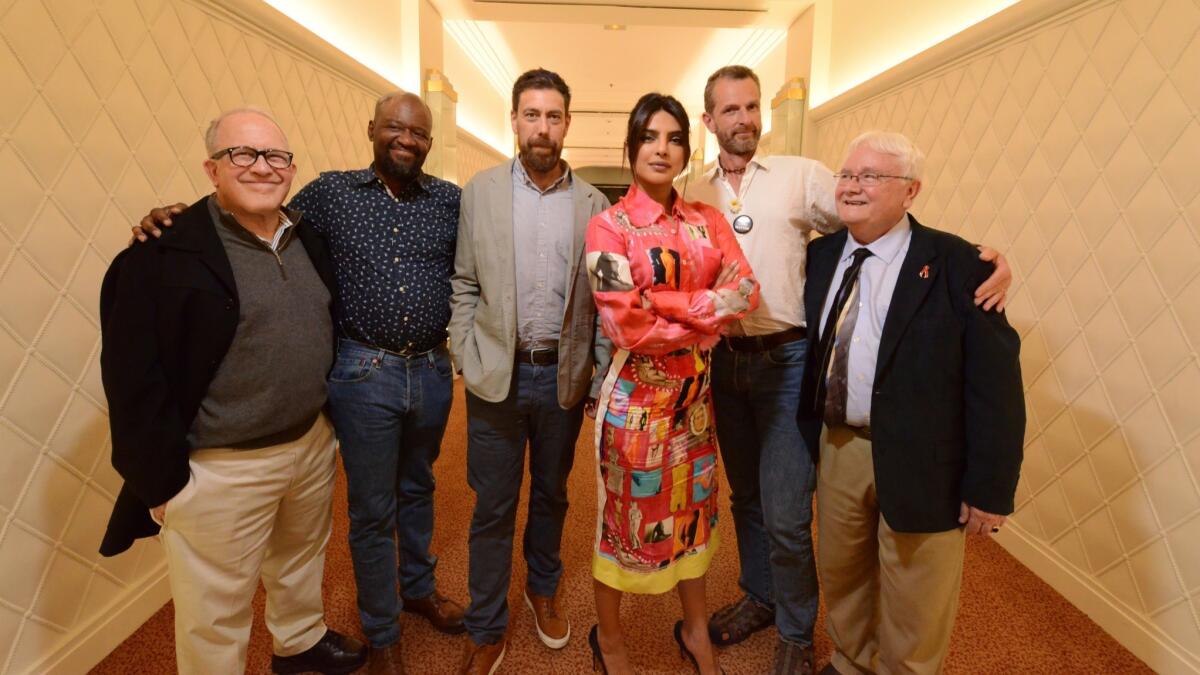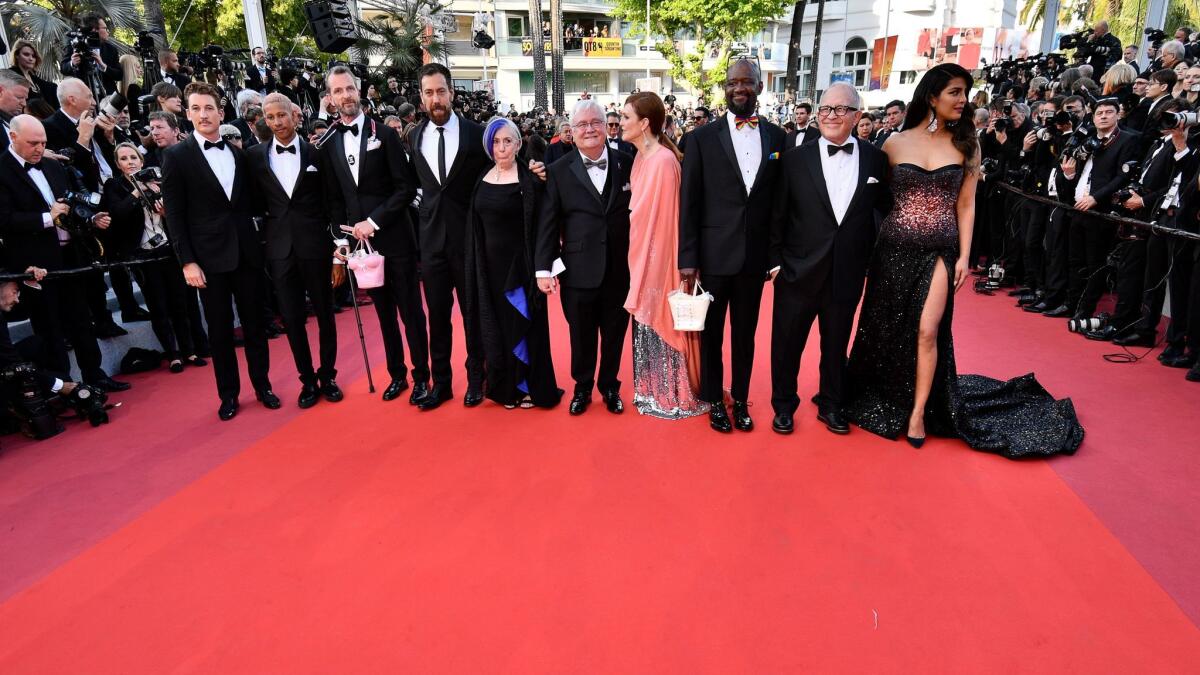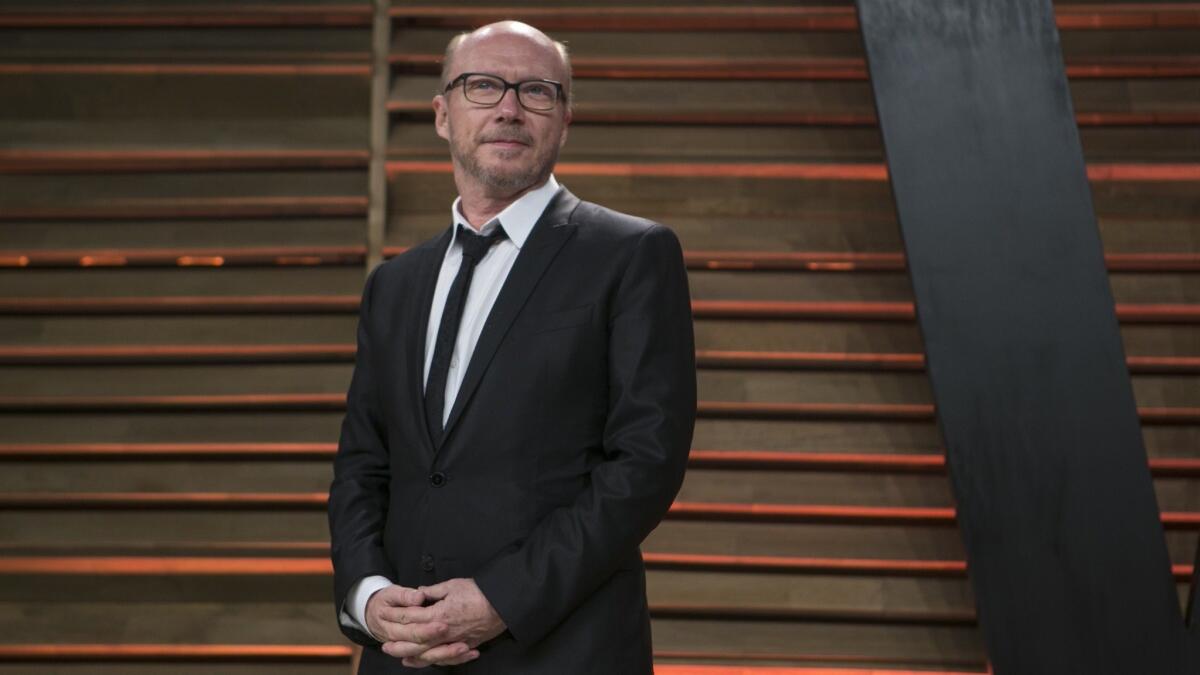AIDS doc ‘5B,’ co-directed by Paul Haggis, uses star power to raise awareness

- Share via
Most directors whose movies play the Cannes Film Festival are eager to fly to the south of France to walk the red carpet clad in black tie.
But when his AIDS documentary “5B” was announced as part of the festival’s program in May, Paul Haggis knew he wouldn’t be making the trip. For one, he was busy putting the final touches on another film he was editing. He’s also not a fan of film festivals, which require dozens of brief, junket-style interviews.
And had he sat for interviews in Cannes, he no doubt would have been asked about the rape charge made against him in 2017 by publicist Haleigh Breest in her ongoing civil lawsuit. Shortly after the case was filed in New York Supreme Court, three other women anonymously told the Associated Press that the Oscar-winning filmmaker was also sexually inappropriate with them.
Haggis, however, is not the only director of “5B.” As the film’s closing credits clearly state, the movie was also made by veteran documentarian Dan Krauss. In fact, in the official Cannes material, Krauss was the only filmmaker mentioned, and he shouldered the movie’s promotional duties in France.
“Because of the civil suit I’m involved with, PR people would want to be careful, and frankly, I understand that,” said Haggis, who refused to comment on the assault allegations. “I’m proud my name is on the film — I do have an ego, of course. But Dan is a smart guy and speaks well, and it’s the film and the people we highlight in it that matter.”
Indeed, “5B” centers on a group of nurses whose stories have never before been so publicly spotlighted. The film focuses on San Francisco General Hospital’s Ward 5B, where in 1983 caregivers began treating AIDS patients and using touch at a time when those with the virus were considered pariahs. The project was financed by Johnson & Johnson, which was looking to spotlight the work nurses do and drive a new generation to the profession — though the filmmakers insist the company had no editorial control over the movie. (The drug company sells its own HIV drugs and has also spent money researching a potential vaccine.)
Over the past year, documentaries have fared exceptionally well at the box office, with break-out hits like “Free Solo” and “Won’t You Be My Neighbor?” grossing over $15 million apiece. But even in this climate, it’s rare for a nonfiction film to receive as big of an opening weekend as “5B.” On Friday, Verizon Media debuted the movie in 127 theaters, marking the first time the company is releasing a movie.
“My philosophy as a leader is when we go and do something, we want to do it all out,” said Guru Gowrappan, chief executive of Verizon Media, noting that the company-owned brands like AOL, Yahoo and HuffPost will all be promoting “5B.” “We went in with a big, bad plan and said we wanted to be in as many theaters as possible. Being shallow doesn’t help, and this is a very important message.”
But despite Gowrappan’s intent, the well-reviewed movie had a weak theatrical launch, bringing in only around $300 per theater. Still, a portion of the ticket sales will be donated to Product (RED), a brand that helps raise money to fight HIV/AIDS. A number of (RED) ambassadors, including Miles Teller and Priyanka Chopra Jonas, attended the Cannes premiere of the film, linked arm-in-arm with the subjects of the documentary as they entered the Palais des Festivals. Chopra Jonas and Julianne Moore — who was already at Cannes as part of a Luca Guadagnino film — also did joint interviews with the “5B” stars, even though they themselves were not in the movie.
“If I can wear a sparkly dress and get on a carpet with people I admire and say ‘Look at them!’ and have everyone take a picture, it’s exciting for me,” Moore said, flanked by Cliff Morrison, one of the co-creators of the hospital’s special care unit. The two were seated in the Chopard suite atop the Hotel Martinez, a VIP-entry-only rooftop space where diamond jewelry was presented to potential buyers on velvet trays.

Moore shared a story of visiting a friend with AIDS in a New York hospital in the early ’80s, recalling how she was required to wear a face mask and bodysuit to enter his room. She said she was struck by “5B” because, unlike fictional films about the crisis, there was no artificially created dramatic arc.
“You see these extraordinary people handling this trauma and how it affected them and what they carried so modestly. I’m gonna cry,” she said, her eyes filling with tears.
“Don’t cry! Then you’ll get me going,” Morrison said. “It all started because there was a man who was dying and he said, ‘I just want someone to hold me,’ so I just took off my shoes and curled up in bed and held him. A lot of those people had no one, and you had to be there for them. If that meant getting next to them, holding them, having their body fluids all over you, you did it and showered later if you needed to. That’s what a caring human being does, even outside of being a professional.”
“There’s such a toughness to you — and a steadiness,” Moore said to him. “He just wasn’t dissuaded by anything. It’s very impressive.”
Chopra Jonas expressed similar deference in her interview, which occurred just one day after she’d viewed the film on her laptop. After asserting that AIDS affects more women than men, she paused, turned to two of the movie’s subjects and said: “Please correct me if I’m wrong; I’m not some expert.”
“You’re doing a great job,” responded Alison Moed, who served as 5B’s nurse manager.
Chopra Jonas, who grew up in India, said she was initially interested in the film because she came from a family of caregivers. Her grandmother was a nurse and both of her parents were physicians.
“We don’t even think about what caregivers have to go through,” she said. “I remember Dad being in surgery for like 12 or 15 hours and not being able to come out or eat. The toll it takes — coming home from work when they lost a patient — I know how it changed them and affected them. So when I watched it, I was in tears, first of all. And second of all, what got me was a sense of pride that I come from a family of medicine. It’s the closest profession to God. It’s completely selfless.”
Krauss said he did not suggest partnering with celebrity activists to raise awareness about the film, but when the support was offered, he gladly accepted it.
“Anyone who wants to help bring attention to the film, why would you say no to that?” the director said. “And also, the support that they’re lending the film is really from a sincere place. It’s real. It’s not an ego thing for them. I’m a documentary filmmaker, so I have a pretty good bull meter. And I don’t detect a scintilla of bull from the people who came out.”
None of the celebrities who’d attached themselves to “5B,” nor the film’s subjects, made any mention of Haggis in Cannes. The nurses never interacted with him during production, as the Bay Area-based Krauss conducted the interviews and Haggis later edited the project from his office in New York.
Krauss views the film as a “call to arms for the younger generation,” a reminder of how fear can be an activating force instead of a destructive one. Similarly, Haggis feels the movie could prove resonant in a time when politicians are using fear to “try to manipulate and divide us.” He said that after President Trump’s election, one of his daughters, who is gay, called him to have him “look into residency in another country” because she was worried her daughter might be taken away from her.
“We think this story is in the past, but it’s ever-present in the lives of a lot of gay people,” he said.

Asked if he felt exiled by Hollywood in the wake of the allegations against him, Haggis kidded that he’d “exiled himself” to New York and Europe. He said he had not shopped a project since facing the charges but is about to try to sell a documentary he recently wrapped centering on a musician.
“So I guess I’ll find out the answer soon,” he said. “I haven’t spoken about [the allegations] since they happened, and I can’t now. It’s not really appropriate. I look forward to talking — actually, I don’t. I have complete trust in the courts.”
Krauss, meanwhile, said he remains hopeful that “the integrity of the film subjects and the story speaks louder than any of the discussion around what Paul’s involved in.”
“We’re not making a tentpole. This is not a big money-making franchise,” he continued. “And I want people’s focus to be on that and not on Paul Haggis’ personal charges.”
Follow me on Twitter @AmyKinLA
More to Read
Only good movies
Get the Indie Focus newsletter, Mark Olsen's weekly guide to the world of cinema.
You may occasionally receive promotional content from the Los Angeles Times.











